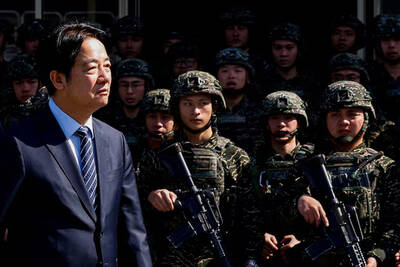The National Applied Research Laboratories (NARL) has developed a nanochip that can detect a variety of toxins and pollutants to help prevent gas explosions or poisoning.
The NARL spent two years developing the nano gas sensing chip, which is small enough to be fitted in a smartphone, watch or other wearable devices, and can detect carbon monoxide, carbon dioxide, volatile organic compounds and formaldehyde, researcher Hsueh Ting-jen (薛丁仁) told a news conference in Taipei.
Following the Kaohsiung gas pipeline explosions in 2014 — which killed 32 people and injured 321 — the NARL began developing a chip that can turn smartphones and smartwatches into portable gas detectors to help improve public safety and government response.
“Smartphones installed with the chip can issue a warning when they detect a gas leak or unhealthy levels of formaldehyde, a carcinogenic material commonly used to produce paints and coatings, Hsueh said.
“The chip can also be used to perform breath tests for alcohol, detect carbon dioxide and carbon monoxide levels, and monitor air quality,” he added.
Data collected by individual smartphones can be uploaded to fire departments and hospitals, and collectively processed to prompt emergency responses, he said.
The chip, which is smaller than a grain of rice, is made with nanoparticle and nano-pore forming technology to create a thin sensing film that has a large exposure area and is highly accurate, Hsueh said.
It can resist temperatures of up to 250°C, and uses different metals to recognize different types of gases.
Commercially available gas sensors are generally palm-sized, can only be installed in a fixed position and are usually designed to detect only one type of gas, with each sensor costing hundreds of New Taiwan dollars.
While new detectors smaller than 1cm have been introduced to the market, they lack the accuracy to detect different gases and are still too large to be integrated into smartphones, Hsueh said.
The cost of one chip is only about one-sixth that of a gas sensor on the market, the NARL said.
The NARL plans to transfer the technology to a local LED manufacturer for modular programming to be used in smartphones, it said.
It is estimated that the market for gas detectors would grow to US$2 billion by 2021, while global production would increase from 1.2 million to 350 million units, the NARL said.
NARL president Lo Ching-hua (羅清華) said that the chip could also be installed in vehicles to prevent people whose alcohol levels exceed legal limits from starting their cars.

The Taipei Mass Rapid Transit (MRT) Wanda-Zhonghe Line is 81.7 percent complete, with public opening targeted for the end of 2027, New Taipei City Mayor Hou You-yi (侯友宜) said today. Surrounding roads are to be open to the public by the end of next year, Hou said during an inspection of construction progress. The 9.5km line, featuring nine underground stations and one depot, is expected to connect Chiang Kai-shek Memorial Hall Station to Chukuang Station in New Taipei City’s Jhonghe District (中和). All 18 tunnels for the line are complete, while the main structures of the stations and depot are mostly finished, he

The first global hotel Keys Selection by the Michelin Guide includes four hotels in Taiwan, Michelin announced yesterday. All four received the “Michelin One Key,” indicating guests are to experience a “very special stay” at any of the locations as the establishments are “a true gem with personality. Service always goes the extra mile, and the hotel provides much more than others in its price range.” Of the four hotels, three are located in Taipei and one in Taichung. In Taipei, the One Key accolades were awarded to the Capella Taipei, Kimpton Da An Taipei and Mandarin Oriental Taipei. Capella Taipei was described by

Minister of Economic Affairs Kung Ming-hsin (龔明鑫) yesterday said that private-sector refiners are willing to stop buying Russian naphtha should the EU ask them to, after a group of non-governmental organizations, including the Centre for Research on Energy and Clean Air (CREA), criticized the nation’s continued business with the country. While Taiwan joined the US and its Western allies in putting broad sanctions on Russia after it invaded Ukraine in 2022, it did not explicitly ban imports of naphtha, a major hard-currency earner for Russia. While state-owned firms stopped importing Russian oil in 2023, there is no restriction on private companies to

President William Lai (賴清德) is expected to announce a new advanced “all-domain” air defense system to better defend against China when he gives his keynote national day speech today, four sources familiar with the matter said. Taiwan is ramping up defense spending and modernizing its armed forces, but faces a China that has a far larger military and is adding its own advanced new weapons such as stealth fighter jets, aircraft carriers and a huge array of missiles. Lai is expected to announce the air defense system dubbed “Taiwan Dome” in his speech this morning, one of the sources said. The system